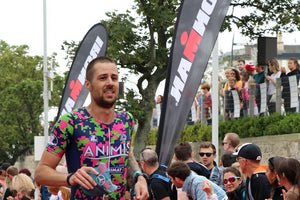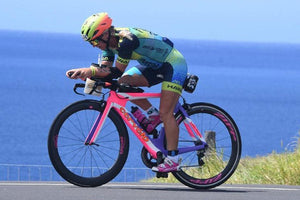
Whether you’re new to the sport of triathlon or you’re looking to take your racing to the next level, this series of articles will help you on your journey to your first Ironman. Covering numerous topics and answering all your questions from fitting the extensive training around work and family life to a complete kit guide, example workouts, and how to choose a race including testimonials from those who have done them. This is your ultimate companion to becoming an Ironman.
Introduction to triathlon
So you’ve heard of triathlon and Ironman racing but you’re not all that sure what it entails. You know that there are three disciplines - swim, bike, run - and that it’s tough. However, triathlon is a hugely complex sport and there is a lot more to it than meets the eye. Once you decide you want to be a triathlete, you have to go all in. Anyone can sign up for a 10k, half marathon, or even full marathon, put in some training time, turn up on the day and get through it relatively unscathed. But triathlon is different. Read on to find out why.

Do you have what it takes?
The question a lot of people ask before diving head first into the world of triathlon is “can I do this with no experience?” The good news is that the answer is a resounding yes. Anyone can train to be a triathlete and even an Ironman, but you have to have dedication and train hard. You also have to be willing to spend a fair amount of money and be consistent. This means making sacrifices and turning this into a lifestyle. Early morning training sessions while everyone else is asleep will become the norm and missing meals out and drinks with friends are just part and parcel of the process. If this is not something you’re willing to do, it’s time to rethink.
Before embarking on a journey as an Ironman triathlete, you should consult with your family. Your training, spending, and racing will have a huge impact on them, especially if you have a spouse and children. Talk it through and explain your intentions. Team GB Age Group triathlete Leigh Harris explains, “It’s very important to get your family on board with what you want to achieve. You won’t be able to do it without their support and unless you can communicate your goals with them, then it’ll be hard for them to understand your training.”
If you really get the triathlon bug, it could mean travelling abroad for races and this means spending even more money and planning family holidays around your training and racing schedule. Team GB Age Group triathlete Alice Tourell even combined her racing at the World Age Group Championships in Australia with her honeymoon. If your family are fully supportive and on board, it will make the process a lot more enjoyable for everyone involved. Ironman racing itself may be tough enough, but it’s the training that really takes its toll and if you can’t enjoy that, you should rethink the entire plan.

So you want to be an Ironman
Depending on your sporting background, there may be a lot of kit you need to buy before you begin your triathlon journey. This sport is one that cannot be done halfway; you have to go all-in and that means spending money on a road bike, helmet, trisuit, swimming lessons, race entry… and that’s just if you’re going to go as basic as possible. If you find you fall in love with triathlon, you’ll end up spending even more on a specialist triathlon bike, cleats and clipless pedals, aero helmet, a triathlon coach, wetsuit, and more. The costs can really mount up so make sure you know what you’re getting yourself into.
Next, you need to make sure you’ve got the time to train; the training is most of the experience and it has to be enjoyable. Make sure you know why you’re doing this and remember that it’s supposed to be fun. If you’re not a swimmer, you’ll definitely need specialist triathlon swim coaching as open water swimming is a far cry from swimming lengths at your local leisure centre.
Ironman racing is all about endurance and so you need to get in the time on your feet and in the saddle. If you have a particularly demanding job or home life, make sure you’ll be able to fit training in around your daily schedule. At a minimum, you’re looking at 10-12 hours of training a week to successfully hit your goal of becoming an Ironman. It’s definitely not something you can achieve on a wing and a prayer.
Finally, you need to think about joining a triathlon club. Training on your own is certainly a viable option, but you will miss out on important training practices like mass swim starts and drafting. These are skills that could be key to your success and are what sets Ironman racing apart from any other sport. Think about joining a triathlon club that’s local to you, especially as being surrounded by like-minded people with a joint goal could really help you with motivation.





